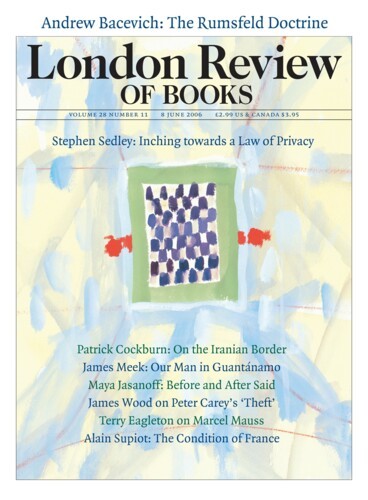It’s not true to say that only bad books make the bestseller list. But it is a little bit true, and it is always the case that bad books greatly outnumber good ones at the top end of the charts. Sometimes, too, you come across an example of pure negative correlation between the quality of a book and the level of its sales. One such example is upon us in the case of Being Freddie, the autobiography of England’s cricketing national hero Andrew ‘Freddie’ Flintoff. Being Freddie has sold more than 300,000 copies in the UK, and is set to be the bestselling cricket book, not only of the current moment but of all time. Even by the standards of numbingly dull sports autobiographies, Being Freddie is an absolute corker – one of those books so boring that to read it is to attain some meditative or Yogic state of internal emptiness and non-being. Typical sentence: ‘The big win at Lord’s instilled us with confidence as we moved on to Edgbaston, another of our favourite venues.’
You would have to be unusually naive to think that Freddie himself wrote Being Freddie. The broad rule of thumb seems to be that if there’s a picture of the ‘author’ on the front of the book, the alleged author didn’t write it. (I used not to understand why everyone in publishing uses the, to my ear, slightly pompous term ‘author’ instead of calling writers writers. But then it is a much more useful and accurate term, since so many ‘authors’ aren’t writers at all.)
There is no law saying that anyone has to read these books, and the pain suffered by doing so is entirely self-inflicted. Still, it seems a pity that so few cricketers try to write their own books. Cricket is the most introspective team sport, for reasons which mainly boil down to the amount of time the game takes. That must be one of the reasons why cricketers are more given than other sportsmen to committing suicide. You’d have thought that a group of sportsmen sufficiently introspective to top themselves in statistically significant numbers would be sufficiently introspective to write books. But it doesn’t seem to work that way.
Steve Waugh, the most capped cricketer of all time, and for some years the best batsman in the world, has always been known for his stubbornness and contrarian streak. His innings were more famous for their length and their determination than their beauty, and his autobiography is the same, but – and it would be notable if for no other reason than this – at least he wrote it himself. All eight hundred pages of it. In longhand. Out of My Comfort Zone weighs in at around 250,000 words, making it, by my calculations, the longest book written entirely in pen since A Suitable Boy.
I’m not going to complain about the prose in Out of My Comfort Zone; actually, there’s something rather moving, and revealing of Waugh’s character, in its very doggedness. I turned to the book out of an interest in sledging. This is the cricketing practice in which the fielding team abuses the batsman in an attempt to unsettle him and cause mistakes. Professional cricketers will discuss sledging only in the most general terms; they say it happens but they abide by the rule that ‘what happens on the pitch stays on the pitch,’ so you never get to know exactly what it is they’re saying to each other. There are microphones in the stumps, but TV stations worldwide don’t let viewers listen directly in to what’s being said, presumably to protect our delicate sensibilities from remarks such as Merv Hughes’s line to Derek Randall, after he had played at the ball and missed once too often: ‘I’ll bowl yer a fackin’ piano and see if yer can play that, yer Pommie poofter.’ The Australian team under Waugh were said to be the most vehement sledgers in world cricket. Waugh has said elsewhere that sledging is part of a process of ‘psychological disintegration’ that he attempts to apply to opponents, though he doesn’t use that line in the book, perhaps because it sounds so nasty. People seemed genuinely to fear the Australians’ sledging. So what on earth was it they said?
Waugh’s book doesn’t solve that mystery, though he does, interestingly for such a tough man, heavily stress the self-doubt to which professional cricketers are prone. He offers some detail about sledging; but the exchanges are much more clipped, and more macho, than you might have thought from the line about ‘psychological disintegration’. ‘What the fuck are you looking at?’ he asks the great fast bowler Curtly Ambrose, and to his not unreasonable reply – ‘Don’t cuss me, man’ – he in turn replies: ‘Why don’t you go and get fucked?’ When Waqar Younis, the Pakistani genius of reverse swing, murmurs, ‘I’m going to kill you,’ his retort is: ‘I thought you were supposed to be quick.’ It’s not the Algonquin Round Table. Why does this add up to ‘psychological disintegration’? If someone came up behind you and said, ‘crap sentence’, every time you wrote anything, would it put you off, if you knew that they were only doing it to put you off? Or might it put you on? It’s not that different from being reviewed. I suppose Waugh would say that it was like having your book reviewed while you were in the middle of writing it. Now that would be off-putting.
Send Letters To:
The Editor
London Review of Books,
28 Little Russell Street
London, WC1A 2HN
letters@lrb.co.uk
Please include name, address, and a telephone number.

